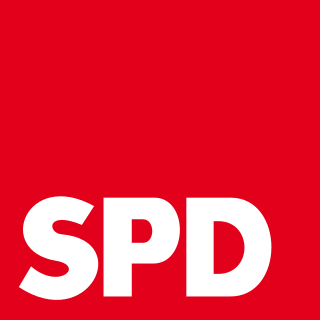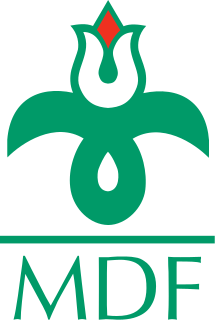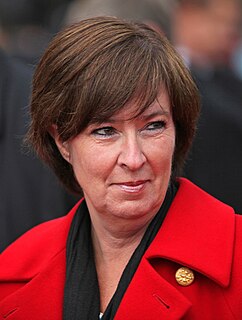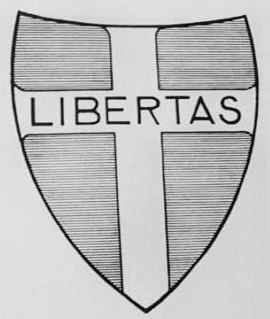
A political party is an organization that coordinates candidates to compete in a particular country's elections. It is common for the members of a party to hold similar ideas about politics, and parties may promote specific ideological or policy goals.
A communist party is a political party that seeks to realize the socio-economic goals of communism. The term communist party was popularized by the title of The Manifesto of the Communist Party (1848) by Karl Marx and Friedrich Engels. As a vanguard party, the communist party guides the political education and development of the working class (proletariat). As a ruling party, the communist party exercises power through the dictatorship of the proletariat. Vladimir Lenin developed the idea of the communist party as the revolutionary vanguard, when the socialist movement in Imperial Russia was divided into ideologically opposed factions, the Bolshevik faction and the Menshevik faction. To be politically effective, Lenin proposed a small vanguard party managed with democratic centralism which allowed centralized command of a disciplined cadre of professional revolutionaries. Once a policy was agreed upon, realizing political goals required every Bolshevik's total commitment to the agreed-upon policy.

The Social Democratic Party of Germany is a centre-left social democratic political party in Germany. It is one of the two major parties of contemporary Germany along with the Union parties (CDU/CSU).

Early modern Europe, also referred to as the post-medieval period, is the period of European history between the end of the Middle Ages and the beginning of the Industrial Revolution, roughly the late 15th century to the late 18th century. Historians variously mark the beginning of the early modern period with the invention of moveable type printing in the 1450s, the Fall of Constantinople and end of the Hundred Years’ War in 1453, the end of the Wars of the Roses in 1485, the beginning of the High Renaissance in Italy in the 1490s, the end of the Reconquista and subsequent voyages of Christopher Columbus to the Americas in 1492, or the start of the Protestant Reformation in 1517. The precise dates of its end point also vary and are usually linked with either the start of the French Revolution in 1789 or with the more vaguely defined beginning of the Industrial Revolution in late 18th century England.
New Right is a term for various right-wing political groups or policies in different countries. It has also been used to describe the emergence of Eastern European parties after the collapse of the Soviet Union.
The Alliance Party of Northern Ireland (APNI), or simply Alliance, is a liberal and centrist political party in Northern Ireland. As of the 2022 Northern Ireland Assembly election, it is the third-largest party in the Northern Ireland Assembly, holding seventeen seats, and has made recent breakthroughs to place third in first preference votes in the 2019 European Parliament election and third highest-polling regionally at the 2019 UK general election. The party won one of the three Northern Ireland seats in the European Parliament, and one seat, North Down, in the House of Commons, the lower house of the Parliament of the United Kingdom.
A party system is a concept in comparative political science concerning the system of government by political parties in a democratic country. The idea is that political parties have basic similarities: they control the government, have a stable base of mass popular support, and create internal mechanisms for controlling funding, information and nominations.

The Hungarian Democratic Forum was a centre-right political party in Hungary. It had a Hungarian nationalist, national-conservative, Christian-democratic ideology. The party was represented continuously in the National Assembly from the restoration of democracy in 1990 until 2010. It was dissolved on 8 April 2011.

The Movement for Rights and Freedoms is a centrist political party in Bulgaria with a support base among ethnic minority communities.
Welsh Labour is the branch of the United Kingdom Labour Party in Wales and the largest party in modern Welsh politics. Welsh Labour and its forebears won a plurality of the Welsh vote at every UK general election since 1922, Senedd election since 1999, and European Parliament election in 1979–2004 and 2014. Welsh Labour holds 22 of the 40 Welsh seats in the UK Parliament, 30 of the 60 seats in the Welsh Senedd and 576 of the 1,264 councillors in principal local authorities, including overall control of 10 of the 22 principal local authorities.

General elections were held in Sweden on 19 September 2010 to elect the 349 members of the Riksdag. The main contenders of the election were the governing centre-right coalition the Alliance, consisting of the Moderate Party, the Centre Party, the Liberal People's Party and the Christian Democrats; and the opposition centre-left coalition the Red-Greens, consisting of the Social Democrats, the Left Party and the Green Party.
Right-wing populism, also called national populism and right-wing nationalism, is a political ideology which combines right-wing politics and populist rhetoric and themes. Its rhetoric employs anti-elitist sentiments, opposition to the Establishment, and speaking to and/or for the "common people". Recurring themes of right-wing populists include neo-nationalism, social conservatism, and economic nationalism. Frequently, they aim to defend a national culture, identity, and economy against perceived attacks by outsiders.

GERB is a conservative, populist political party which was the ruling party of Bulgaria between 2009 and 2021.

The Italian People's Party, also translated as Italian Popular Party, was a Christian-democratic political party in Italy inspired by Catholic social teaching. It was active in the 1920s, but fell apart because it was deeply split between the pro- and anti-fascist elements. Its platform called for an elective Senate, proportional representation, corporatism, agrarian reform, women's suffrage, political decentralization, independence of the Catholic Church, and social legislation.
In politics, a cartel party or cartel political party is a party which uses the resources of the state to maintain its position within the political system, operating similar to a cartel. Katz and Mair argue that "parties in Western Europe have adapted themselves to declining levels of participation and involvement in party activities by not only turning to resources provided by the state but by doing so in a collusive manner".
The Frontpartij was a Belgian political party that campaigned for increasing recognition for the Flemish people and their language. Originating from the earlier Frontbeweging, the Frontpartij was an early attempt to fully politicise the Flemish Movement. In contrast to some of its successor movements the party supported democracy and autonomy rather than authoritarianism and independence.

The National Fascist Party of Argentina was a fascist political party formed in 1923.

The Socialist Party is a centre-left, social-democratic, political party in France. It holds pro-European views. The PS was for decades the largest party of the French left and used to be one of the two major political parties in the French Fifth Republic, along with The Republicans. It replaced the earlier French Section of the Workers' International in 1969 and is currently led by First Secretary Olivier Faure. The PS is a member of the Party of European Socialists, Progressive Alliance and Socialist International.

DENK is a political party in the Netherlands, founded on a minority rights platform. It is legally registered as "Politieke Beweging Denk".
Modernism or modernist Islam, in the context of Muslim society in Indonesia, refers to a religious movement which puts emphasis on teachings purely derived from the Islamic religious scriptures, the Qur'an and Hadith. Modernism is often contrasted with traditionalism, which upholds ulama-based and syncretic vernacular traditions. Modernism is inspired by reformism during the late-19th to early 20th century based in the Middle East, such as the Islamic modernist, Salafiyya and Wahhabi movements. Throughout the history of contemporary Muslim Indonesia, these movements have inspired various religious organizations; from the mass organization Muhammadiyah (1912), political party Masyumi Party (1943), to missionary organization Indonesian Islamic Dawah Council (1967).










